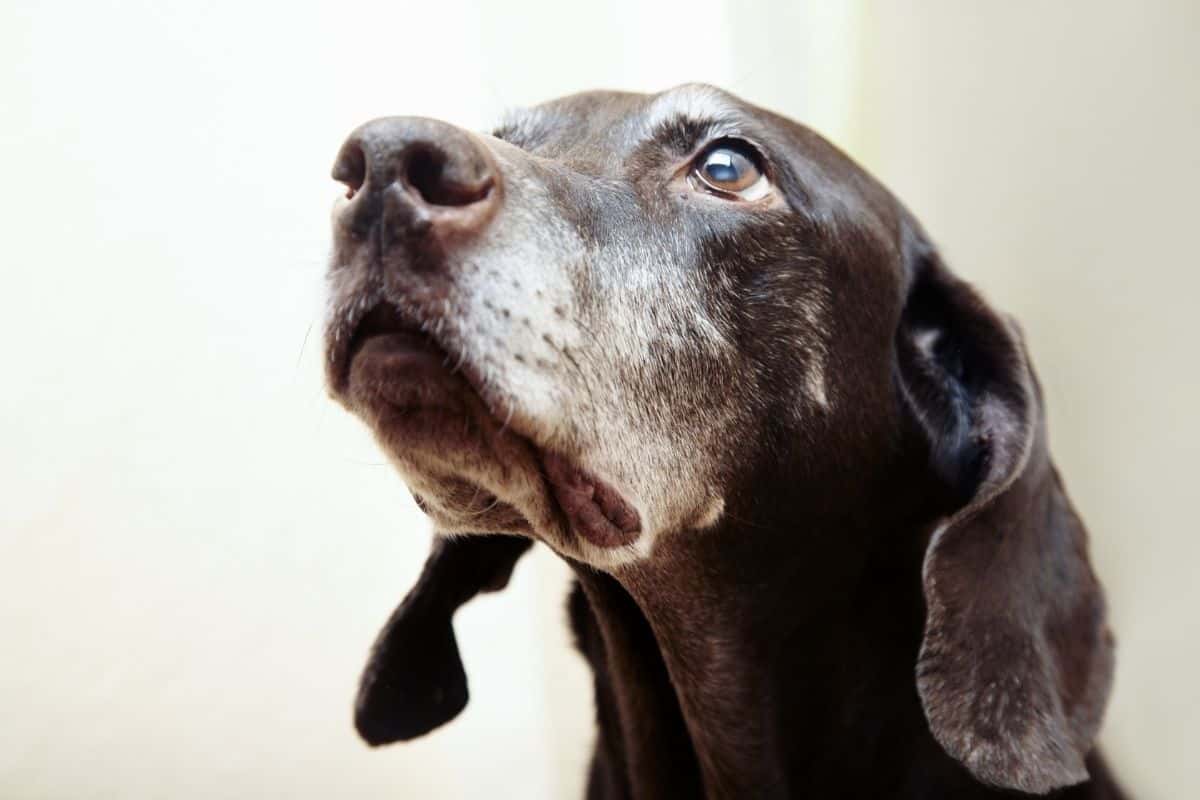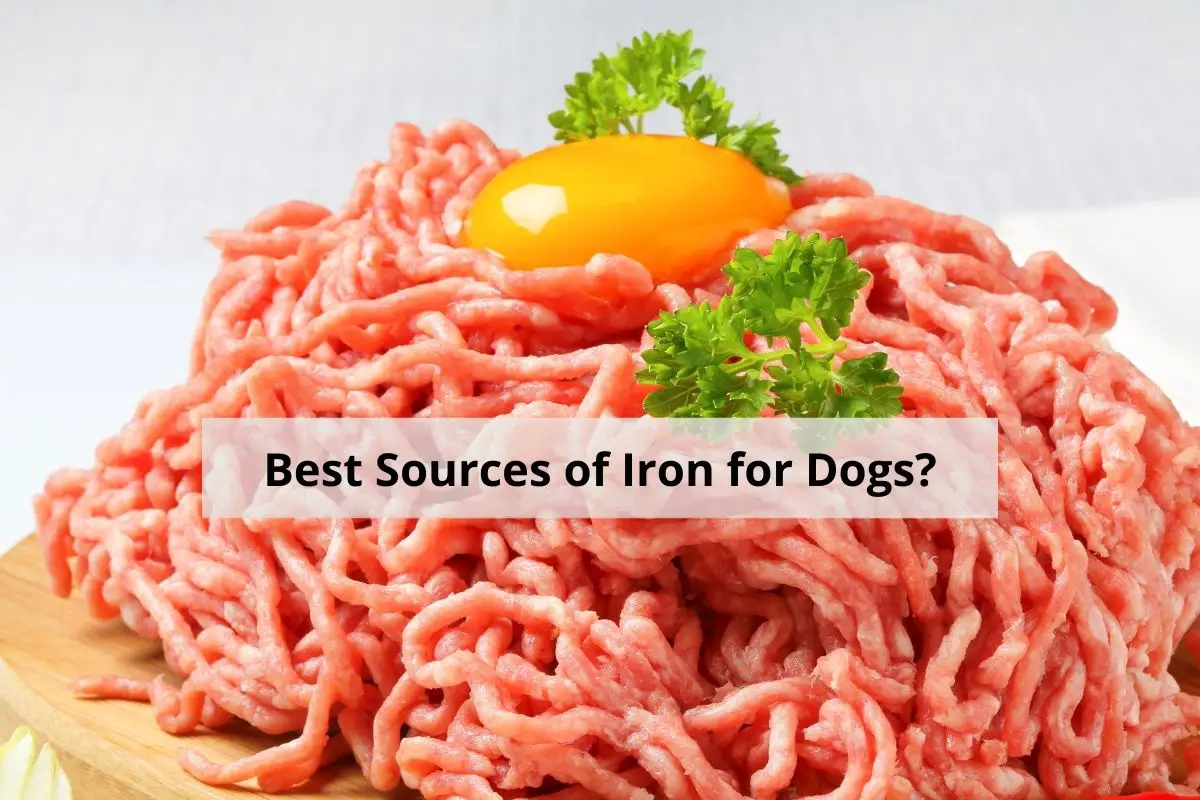As dogs age, their metabolism may undergo changes that come to affect their eating habits in a variety of ways. You might have noticed that your elderly dog is much more hungry than normal, to the point where it has caused some concern, and since your dog can not speak to tell you what is wrong, pinpointing the reason for this is not always easy. So, what is causing your elderly dog to be so hungry?
The reasons why your elderly dog is so hungry are that it may not be getting enough nutrients from its current diet, it may have parasites in its digestive tract, diabetes, thyroid dysfunction, stress and/or depression, or a broad range of other diseases, such as kidney stones or stomach cancer.
We will begin this article by explaining how to recognize abnormal eating behaviors in your elderly dog. Next, we will cover the ways that a dog’s digestive system and eating habits come to change as they age. Lastly, we will go over the possible reasons why your elderly dog is so hungry and what you can do about it.
Recognizing Abnormal Eating Behavior in Dogs
For pet owners who regularly care for and are close with their dogs, it is not hard to tell when something is off with their behavior.
When your dog is experiencing a problem, one of the most likely places it will become apparent is its eating behavior. However, the source of this problem is very difficult to diagnose because its root source may be something physical, emotional, or environmental.
This leaves the door open to many possibilities and poses a barrier to understanding.
Another obstacle people commonly face when addressing what we perceive to be abnormal eating behavior in our dogs is self-doubt about the severity of the problem. Many dog owners will second-guess themselves into believing that they may be overreacting and that the problem may be all in their heads.
While it is normal for dogs to have an off day or two, or for their eating habits to fluctuate in general slightly, concerned dog owners will know on a very instinctual level when their dogs eating abnormality is not merely incidental but a sign of something more urgent.
If you feel that your dog is exhibiting alarming behavior regarding its eating, trust your intuition and do not ignore the problem.
Many of the problems that can cause your elderly dog to become excessively hungry rely on early detection to limit and negate the effects of their damage.
While this article aims to address the specific problem of overeating in elderly dogs, it is worth providing a list of all signs of eating disorders in dogs, if nothing else, then for future reference.
The signs of abnormal eating behavior in dogs are:
- Eating too fast without chewing or pacing, leading to choking, gagging, or vomiting
- Not eating and showing disinterest in food
- Overeating and acting hungry even after just having eaten
- Eating its own feces
- Continually eating or attempting to eat inedible objects, such as plastic or cotton clothing
These behaviors can indicate much more serious problems in your dog and should be addressed immediately.
Digestive System Variance in Elderly Dogs
Like humans, dogs experience physiological changes as they age. These changes, of course, encompass all aspects of their systemic functions, and their digestive systems are no exception.
Elderly dogs require more attention and special care. Oftentimes, veterinarians may recommend your elderly dog be put on a special diet. The aim of these diets is typically to lessen inflammation, promote joint health, maintain energy levels, and accommodate healthy digestions and defecation.
One of the most important inclusions in a senior dog’s diet is the inclusion of high protein. This will help them to retain strength and ward off muscular atrophy as they age.
Puppies and younger dogs have the luxury of requiring less specific diets and can typically, therefore, remain healthy and energetic with a generalized diet blend.
Senior dogs have slower metabolisms and take longer to digest food. They are also more sensitive to changes in their diets, and their bodies are less tolerant of atypical foods.
One of the best dry food products on the market for elderly dogs is Blue Buffalo’s Life Protection Formula.
If you are a senior dog owner, talk to your vet about specialized diets aimed toward elderly dogs and what they recommend them to eat.
The Most Likely Reasons Why Your Elderly Dog Is So Hungry
Now that we have gone over how to recognize negative eating habits and disorders in your dog, and when to draw concern, as well as how a dog’s dietary needs and their digestive system begins to change as they age, we can now discuss the specific reasons why your elderly dog is so hungry.
As stated earlier, there are many different reasons for this insatiable hunger behavior in older dogs. This list will necessarily cover a wide range of causes in an attempt to encompass all potential sources of the problem.
You Are Not Feeding Your Dog Enough/the Right Food, or Your Dog Is Lacking Self-Control
One of the first things to consider is that you are simply not feeding your dog enough.
While this may seem obvious, it is often the case that many dog owners will underfeed their dogs by providing insufficient portions. While your dog may have gotten by on this general amount before, it may no longer be able to and is now beginning to outwardly protest and demand more food.
Elderly dogs like routine and they like to know when they will be fed.
If this is the case, then simply feeding your dog larger portions and/or more frequently will be enough to satisfy its hunger and resolve the problem.
Also included in this explanation is the possibility that while you are feeding your dog enough calories, its nutritional requirements have changed, and their old diet is no longer suited to meet their needs.
Lastly, your dog may just be indulgent and lack self-control when it comes to food. Like many humans, some dogs just do not know when to cut it off with food. They may believe they are hungry even when they are not. If this is the case, they will just need to be controlled until they settle into the realization that they are not permitted to eat this much.
Your Dog Has Parasites
Parasites are common in dogs, especially those who frequently venture outdoors for a little mischief and exploration. However, parasites are sneaky and can also affect dogs that spend all or the majority of their time indoors.
Roundworms are a common parasite that dwells in dogs’ digestive systems and robs them of nutrients from the food they eat. This can make it impossible for your dog to receive adequate nutrients, and if the problem is not resolved, it will lead to worsening conditions and even death.
If your dog has contracted roundworms, this will usually be accompanied by signs related to their excretion, such as constipation or diarrhea. Still, you can’t always rely on the presence of these signs.
Parasites are usually fairly easy to get rid of with prescribed medicine, but the longer they are able to remain and reproduce in the dog’s body, the more threat they pose. Early detection is big.
Your Elderly Dog May Have Diabetes
One of the first things that your vet will likely look for in an elderly dog that is hungry all the time is diabetes.
Unfortunately, even dogs who are physically active and closely adhere to a healthy diet can still develop diabetes as they age.
This is no different than the way that diabetes manifests itself in humans.
Diabetes can occur either due to your dog’s pancreas becoming no longer able to produce enough insulin or because its insulin receptors have become desensitized and ceased to function properly.
This means that your dog’s body will no longer be able to use insulin to convert the glucose from its food source into energy.
As a result, your dog will continuously demand food in an attempt to convert this glucose into energy, but to no avail. The glucose will remain in the bloodstream, and its blood sugar levels will rise accordingly.
Your dog will need to receive insulin at the order of a veterinarian if this is the case.
Stress
Dogs are much more psychologically complex than most people give them credit for.
They are very sensitive to emotion, as well as their environment.
Elderly dogs, in particular, are often antagonistic to change and will act out in odd ways like constant hunger.
Simple things, such as moving to a new home or residence, getting another pet, having a baby, or being away from home more than normal, can lead your dog to become stressed, lonely, or depressed.
If no physical ailments present themselves in an examination, your vet may recommend you to begin looking for emotional triggers that have led the dog to negatively alter its behavior.
Thyroid Dysfunction
The thyroid gland is responsible for hormone regulation. These hormones can affect and influence a dog’s metabolic rate and its digestive and eating patterns as a whole.
As a dog ages, its thyroid gland may become weak and can no longer produce enough thyroid hormone to regulate the metabolic rate. This condition is known as hypothyroidism.
The result of this is your dog’s metabolism will slow down. In some cases, this will cause your dog to eat more.
This condition will almost always be accompanied by low energy levels in your dog, as well as weight gain.
Hyperthyroidism is a dysfunction where the thyroid gland is overactive, causing the metabolic rate to increase as opposed to the decrease associated with hypothyroidism. This will also cause your dog to be hungry all the time.
Both of these conditions can lead to overeating either directly or indirectly.
Excessive Hunger as a Broad Indicator of Disease
Finally, one of the reasons why an elderly dog may begin overeating beyond a reasonable explanation is that it is a broad sign of something severe, the possibilities of which are too numerous to list.
Dog’s biological systems are extremely complex, and there is always the possibility that their overeating and insatiable hunger could be a sign of something less expected.
It may be to do with a disease somewhere in the body, such as cancer of the liver, stomach, or kidneys. It may be a sign of kidney stones or an ulcer. It can be indicative of heart or bladder disease.
The only way to know for certain is to have a licensed veterinarian conduct a thorough physical exam on your pet.
What To Do When Your Dog’s Hunger Becomes Problematically Excessive
If you notice any irregularities in your dog’s demand for more food, consult a veterinary professional as soon as possible.
Waiting to see if the behavior resolves itself can cost your dog valuable time and allow the condition to worsen.
Trust your instinct and bring your dog in for a check-up at the first sign of alarming dietary behavior.
Conclusion
By writing this article, we wanted to provide elderly dog owners with the most likely reasons why their dog is suddenly exhibiting unsatisfiable hunger cravings.
Many reasons can be at the root of this problem, but the most common are stress/depression, diabetes, thyroid dysfunction, parasites, or insufficient nutrients in their diet.
Always consult a vet for a proper diagnosis as soon as possible if you find that your dog is displaying unusual eating habits.




